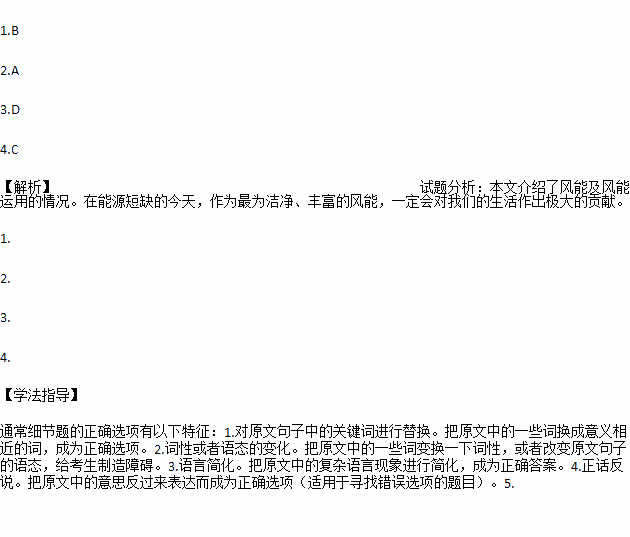题目内容
Think about the different ways that people use the wind. You can use it to fly a kite or to sail a boat. Wind is one of our cleanest and richest power sources, as well as one of the oldest. Evidence shows that windmills(风车) began to be used in ancient Iran back in the 7th century BC. They were first introduced to Europe during the 1100s, when armies returned from the Middle East with knowledge of using wind power.
For many centuries, people used windmills to grind(磨碎) wheat into flour or pump water from deep underground. When electricity was discovered in the late 1800s, people living in remote(偏远的) areas began to use them to produce electricity. This allowed them to have electric lights and radio. However, by the 1940s when electricity was available(可利用的) to people in almost all areas of the United States, windmills were seldom used.
During the 1970s, people started becoming concerned about the pollution that is created when coal and gas are burned to produce electricity. People also realized that the supply of coal and gas would not last forever. Then, wind was rediscovered, though it means higher costs. Today, there is a global movement to supply more and more of our electricity through the use of wind.
1.From the text we know that windmills__________.
A. were invented by European armies
B. used to supply power to radio in remote areas
C. have a history of more than 2,800 years
D. have rarely been used since electricity was discovered
2.What was a new use for wind power in the late 19th century?
A. Producing electricity. B. Sailing a boat.
C. Grinding wheat into flour. D. Pumping water from ground.
3.One of the reasons wind was rediscovered in the 1970s is that______.
A. the supply of coal and gas failed to meet needs
B. it is one of the oldest power sources
C. it was cheaper to create energy from wind
D. wind power is cleaner
4.The passage is mainly about______________.
A. the global pollution from burning coal and gas
B. the worldwide movement to save energy
C. the history of using wind power
D. the advantages of windmills


